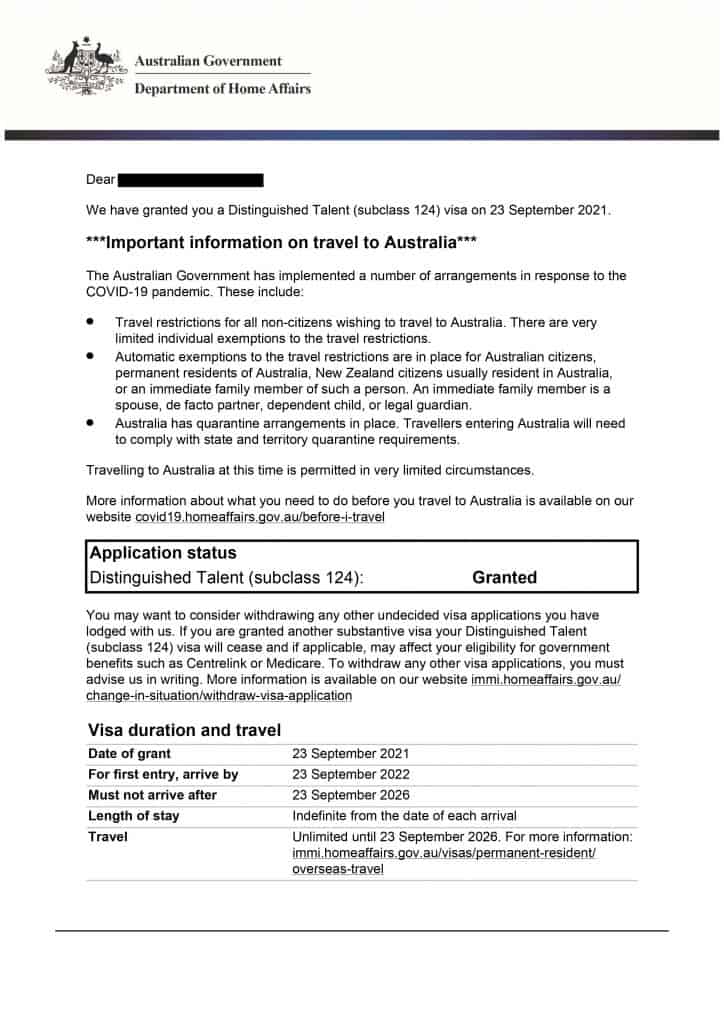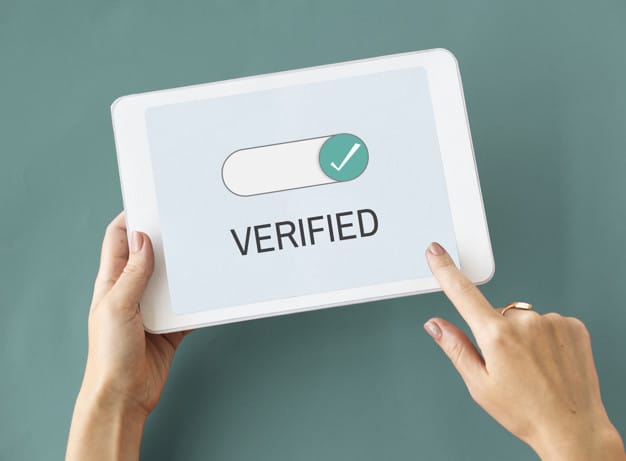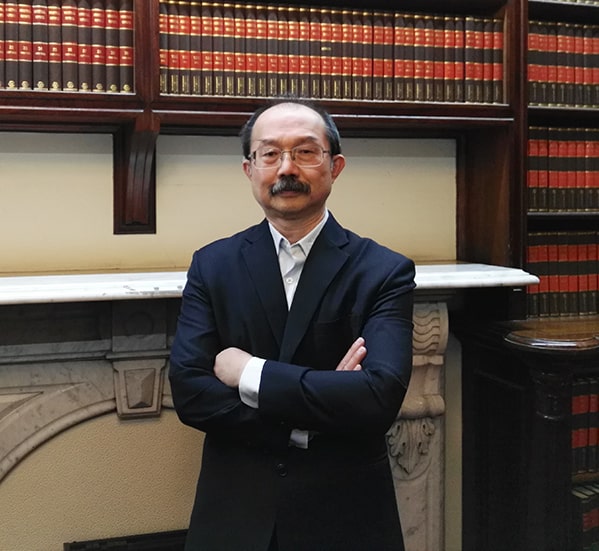
Australia Distinguished Talent (Subclass 124) Visa Is For A Person Who Has An Internationally Recognised Talent
To be eligible for an offshore Distinguished Talent (Subclass 124) Class AL visa, you must be aged between 18 and 55. And you are internationally recognised (still prominent) for a profession, sport, the arts or academia and research, and you would still be an asset to the Australian community. If granted the visa, you must not have difficulty finding employment or establishing yourself. You must also be nominated by an eligible person or organisation associated with your distinguished talent.
Please note that Distinguished Talent (Subclass 124) visa is now merged with Distinguished Talent (Subclass 858) visa. Previously Distinguished Talent (Subclass 124) visa is for applicants who are not in Australia at the time of their application; and Distinguished Talent (Subclass 858) visa is for applicants who are in Australia at the time of their application. Distinguished Talent (Subclass 858) visa is now for anyone, whether they are out or in Australia.
The Distinguished Talent (Subclass 124) visa is for persons who wish to settle permanently in Australia and who have an internationally recognised record of exceptional and outstanding achievement in 1 or more of the below eligible area or have provided specialised assistance to the Australian Government in matters of security.
Eligible area
Direction No 85 gives highest priority to the Distinguished Talent (Subclass 124) visa applications made in relation to the below sectors and where:
- an Australian employee offering employment in Australia with an annual salary equivalent to or higher than the Fair Work High Income Threshold (FWHIT) or $153,600 (FY 2020-2021); or
- the primary applicant’s current earnings are equal or greater than the TWHIT; or
- there is evidence the primary applicant is likely to receive a salary that is equal or greater than the FWHIT.
Relevant sectors (GTI stream)
- AgTech (application of technology to agriculture and food production);
- FinTech (technology that seeks to improve and automate the delivery and use of financial services);
- MedTech (medical technologies and pharmaceuticals);
- Cyber Security;
- Quantum information, Advanced Digital, Data Science and ICT;
- Space and Advanced Manufacturing; and
- Energy and Mining Technology.
If your expertise is in 1 of the above sector and able to provide evidence of your current earnings or future salary equal to or greater than the FWHIT will be given priority processing.
Preference (if meeting any 1 of the above 7 sectors) and highest priority will also be given to those who have:
- Completed a Doctoral degree (PhD) in the last 3 years, or are submitting their thesis in the next 6 months; or
- Completed a Bachelor Honours degree or Masters degree in the last 3 years and have an overall grade-point average of 80 or above (out of 100).
If you do not meet the above, your Distinguished Talent (Subclass 124) visa application will be given second highest priority.
Having a distinguished talent does not mean you have to be unique among your peers, but you should have a demonstrable record of achievements that are out of the ordinary. Similarly, you are not required to be unprecedented, or rare. You must be unusual, or special or uncommon. It is important that you must have an internationally (not just nationally) recognised record of exceptional and outstanding achievement in your field. You must still be prominent in that field at the time of lodging an application for an offshore Australia Distinguished Talent (Subclass 124) visa. You are considered the best in your field. If granted the visa, you would be an asset to the Australian community and would not have difficulty finding employment in your field or becoming established independently in Australia.

Proving you have a distinguished talent
If you are exceptionally good in a job, for example, in research, your work must not only bring benefits to your home country but also internationally. A single achievement even though it is a significant achievement may not be enough. You are expected to have a record of sustained achievements that are not likely to diminish in the future.
Your achievements must be internationally recognised and are in a field practised in other countries, including Australia. You must continue to be active at a high level and has not stopped to be the best in the last 2 years.
Internationally recognised record of exceptional and outstanding achievement
You must have an internationally recognised record of exceptional and outstanding achievement in 1 of the following areas:
- a profession (a vocation requiring knowledge of learning or science)
- a sport (an activity pursued for exercise or pleasure requiring some degree of physical prowess)
- the arts (theoretical or physical expression of creativity found in human cultures and societies, including visual arts, literature, and performance arts)
- academia and research (scholarly and systematic inquiry into a subject to discover facts or principles).
You must still be prominent in the area, would be an asset to the Australian community, would have no difficulty in obtaining employment, or in becoming established independently in Australia in your area of expertise.
What does international recognition mean?
Internationally recognised record of exceptional and outstanding achievement means that your achievements have been or would be acclaimed as exceptional and outstanding anywhere in the world.
The Department will use the following factors to determine if achievement has attained international recognition:
- international standing of the country or countries where you achieved recognition
- the standing of your achievement in relation to Australia standard
- your standing of achievement in relation to international standards.
For e.g., if you are rated at or near the top of your field in your home country would be considered to have an internationally recognised record of exceptional and outstanding achievement if:
- the field is undertaken and recognised in a number of countries; and
- the achievement would be similarly recognised in relation to international and Australian standards for that area.
Examples of meeting the internationally recognised threshold
- an individual holding a senior position (such as senior manager, lead technician, or lecturer) in a highly competitive ‘international organisation’. An organisation with an internationally renowned reputation would be considered as an international organisation.
- an individual with a track record of holding senior positions in organisations in a number of countries
- an individual completing major international projects which have had a wide reaching impact, for e.g. a researcher making COVID-19 vaccine discovery
Requirements of ‘record’, ‘exceptional’ and ‘outstanding’ achievement
What is ‘exceptional’ and ‘outstanding achievement’ is not defined under the Migration Act or Regulations. However, exceptional and outstanding achievement is taken to be the act of accomplishing something extraordinary that places the person above average. If you have an internationally recognised record exceptional and outstanding achievement than you are usually considered to be leader in your particular field.
It is expected that you would generally have a record of sustained and multiple achievement. However, a single achievement may still be regarded as a record of ‘exceptional and outstanding’ achievement if that achievement is cutting edge and highly innovative in nature.
How is ‘exceptional and outstanding achievement’ assessed?
The Department will take into account information such as the below:
- information provided by your nominator who has a national reputation in relation to your area of claimed achievement. For e.g., full account of the reasons why your nominator believes you have an exceptional and outstanding record of achievement
- supporting statements and material detailing relevant aspects of your record of achievement. For e.g., your qualifications, awards, and professional or academic positions held. It should include information relating to your achievements both in Australia and overseas
- supporting statements from internationally recognised individuals or organisations in your claimed area of achievement who are qualified to comment on your achievements and reputation within your area of expertise
- awards you received from internationally recognised institutions or organisations.
Academia and research
If your area of achievement is in the area of academia and research, your should provide evidence of exceptional and outstanding achievements, for e.g.;
- reports commissioned
- books published
- articles published in professional journals, magazines and newspapers
- awards received
- recognition by peers, including citation in journals
- statements of achievement from govern, professional, scientific or other relevant bodies
- honours or accolades
- professional designation, for e.g., as Professor, PhD, or M.D, can include honorary or symbolic, or associated with credentials attesting to specific competence, learning or skills
- membership of international groups and organisations associated with the area of learning
- evidence of government/private grants associated with your research
- evidence of receiving a fellowship or an honorary appointment, for e.g., as Professor or Associate Professor in highly regarded educational institutions that specialises in your field
- scale and audience of research undertaken or completed
- statements from your research supervisor or professor that your thesis or research has strong prospects of being published
- academic statement of results showing high academic achievement from an internationally recognised university
- 1 or more peer reviewed publications in your area of study or research
- links to any reputable websites which refer to you and what you have done or achieved
A Profession
If you are applying for Distinguished Talent (Subclass 124) visa in the area of a profession, you should provide evidence of exceptional and outstanding professional achievements such as:
- national and international industry awards and accolades
- references from current and past employers
- statements from prominent business and industry peers
- academic degrees or professional designations associated with your profession
- personal or professional titles, e.g., CEO, Director, Department Head and Professor, indicating an earned rank or position within the formal structure of your organisation
- newspaper and magazine articles attesting to your achievements and awards
- links to any reputable websites which refer to you and what you have achieved
A sport
Evidence of your exceptional and outstanding sporting achievements can include:
- national and international rankings
- membership of national sporting teams
- results in international competition or tournaments
- statements from international sporting bodies
- sporting scholarships
- newspaper and magazine articles attesting to your achievements
- links to any reputable websites which refer to your sporting achievements
The Arts
Evidence of your exceptional and outstanding achievements in the arts can include:
- books published
- national and internationals sales achieved
- awards and commissions received
- galleries in which works are displayed
- scale and audience of display held
- recognition by peers
- honours and accolades
- academic qualifications associated with your area of the arts
- statements from national and international artistic bodies
- newspaper and magazine articles about your achievements
- links to any reputable websites which refer to your artistic achievement
Can a student apply for Distinguished Talent (Subclass 124) visa?
Yes, you can apply for Distinguished Talent (Subclass 124) visa even you have recently graduated.
If you are relying on your Masters degree or Bachelor Honours degree, you must have an overall grade-point average of 80 or more out of 100 (grade-points does not apply to PhD students).
Your academic achievements can be considered internationally recognised if:
- your research is of international interest and significance; or
- your research would be relevant to an international audience; or
- you have presented your research at international forums; or
- your research could be used to inform academia, governments and industry abroad; or
- your research is relevant to Australian academia, governments and industry that will advance Australia’s international competitiveness; or
- your research highlights the potential for innovation and productivity increases
Your Bachelor Honour or Masters degree must be completed within the last 3 years before you apply for the Distinguished Talent (Subclass 124) visa in order for your to be “still prominent” in your area of academia and research.
Must still be prominent
You may provide the following information or documentation to demonstrate you are still prominent in your field or area of expertise:
- details of recently completed projects
- details of recent publications
- details of current and recently held senior positions in large business or organisation
- evidence of delivering presentation(s) at professional forums, conferences and events
- reference letter from a university or employer
- evidence of patents, trademarks, copyrights, and other IP held
- evidence of national and international awards
- evidence of membership of prominent international bodies, professional associations and current registrations or licences.
Must be an asset to Australia
You must demonstrate you would be an asset to the Australian community. The term “asset” is not defined, but you would be considered an asset if your settlement in Australia will be ‘useful’ to and benefit the Australian public.
Being an asset include economic, social and cultural benefit to the Australian community. You would be an asset to the Australian community if you:
- will raise Australia’s technical and/or academic standards internationally
- will introduce and/or transfer skills to Australia
- will elevate Australia’s competitiveness and reputation in sports and the arts
- will make a significant positive social or cultural impact on the Australian community.
You may provide the following information or documentation to show you will be an ‘asset’:
- evidence that you have created a product or technological advancement that is unique, and cutting edge in nature
- evidence demonstrating that your research fills a significant knowledge gap and will of benefit to industry, business or academia in Australia
- evidence of your involvement in starting up a start-up company.
What is not an “asset” to the Australian community?
You would not be an asset to the Australian community if you are involved in an area that:
- is outside the generally accepted social or cultural norms of most Australians
- is likely to be offensive to most Australians
- would give rise to controversy
Employability
In order to be granted a Distinguished Talent (Subclass 124) visa, you must demonstrate you would have not difficulty in obtaining employment, or in becoming established independently, in Australia within your area of achievement. Employment which is not related to your area of achievement will not satisfy the employability criterion. In addition, you cannot just rely on your existing funds and/or assets, you must show that you can continue to maintain your dependent on your skills in your area of achievement for your income.
How is employability assessed?
- Employment contracts or offers of employment related to your area of achievement for work in Australia.
- Evidence of self-employment or opportunities to establish a viable business within your area of achievement
- Evidence of sponsorships, scholarships, grants or other payments intended to support you while you are engaged in activities related to your area of achievement
- Evidence of your academic qualifications, e.g., PhD or Masters degree
- Evidence of high scores (more than 80 out of 100) for your Bachelor Honours or Masters degree
- Demonstrated track records of previous employment in your area of achievement
Skilled Regional Provisional visa holders
If you are currently holding a Subclass 491 visa (click here to learn more) or Subclass 494 visa (click here to learn more), you may apply for the Distinguished Talent (Subclass 124) visa if you meet the requirements and you must held that visa for at least 3 years before applying.
If granted the offshore Australia Distinguished Talent (Subclass 124) visa, your settlement in Australia must benefit the whole Australian community economically or socially or culturally. Granting you the visa must not only benefit you and/or your nominator or prospective employer. Similarly, having an income from employment in an unrelated field is not enough.

Must be nominated
To be able to apply for the Australia Distinguished Talent (Subclass 124) visa you must be nominated by an Australian citizen or permanent resident or an eligible NZ citizen, or an organisation having national reputation relevant to the area of your achievements. Click here to learn more.
Nomination
To apply for Distinguished Talent (Subclass 124) visa, you must be nominated.
Your nominator who has a national reputation in the same area as you and will be required to complete form 1000 recording your record of achievement.
Your nominator must be an Australian citizen or PR or an eligible NZ citizen or an Australian organisation (operating either inside or outside Australia if they are established by an Australian parent company, or an Australian citizen or PR who continues to operate the business).
Your nominator should have:
- Solid track record of achievement
- Evidence of high calibre
- Leadership in the relevant field of expertise
- Professional associations with lead organisations and industry bodies
- Current and previous employment history
- Participated at conferences both in Australia and internationally
- Contributed to a number of international journals used by researchers, academics and organisations undertaking work in the same field of research
Your nominator can be living outside Australia but they should have a strong international record of achievement making them reputable at a national level.
How to apply for Distinguished Talent (Subclass 124) visa
You can lodge a paper application by completing form 47SV or online form 47DT (internet).
On lodging your application, you will be required to pay the 1VAC and the 2VAC (applicable to 18+ applicant without functional English) is payable before the Distinguished Talent (Subclass 124) visa is granted.
You can include members of your family in a combined application.
You must include form 1000 (Nomination for Distinguished Talent) in your application.
You may also be eligible to apply for Global Talent Independent visa (click here to learn more).

Including family members
You must not be in Australia at the time of visa application and at the time of decision.
Australia Distinguished Talent (Subclass 124) visa is a permanent visa and is valid for 5 years from the date of grant (click here to learn more about RRV 155 visa).
Please note that Subclass 124 is now closed to new applicants. All Distinguished Talent applicants whether in Australia or overseas will now have to apply for the Subclass 858 visa (click here to learn more about Distinguished Talent Class BX Subclass 858 visa).
Australian migration law is complex and difficult to understand, contact our immigration lawyer for a consultation (fee applies) to help you decide if you are eligible for a Distinguished Talent (Class AL) (Subclass 124) visa (click here to find out how an immigration lawyer or registered migration agent can help you). You may also refer to our FAQs for answers regarding visa application or visa cancellation by clicking here.


041 222 4020 or WeChat: AUDvisa
This article is not intended to be or taken as migration legal advice. The author of this article disclaims any liability for any action or omission on the information provided or not provided in this article. You should always consult an immigration lawyer or a registered migration agent to form an informed opinion on your immigration matter.



